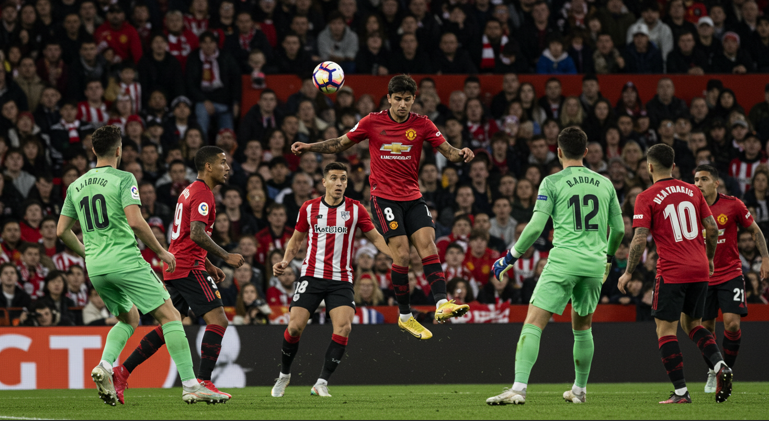Introduction
The upcoming clash between Athletic Club and Manchester United promises to be a significant moment in football history, as it brings together two clubs with rich traditions and prestigious achievements. Athletic Club, based in Bilbao, Spain, is renowned for its unique philosophy of fielding players who are either born or trained in the Basque region. This commitment to local talent has cemented its status as a prominent force in Spanish football, with notable accomplishments including multiple Copa del Rey titles and La Liga championships. The club’s passion and dedication to its roots creates a compelling narrative that is deeply woven into its identity.
On the other hand, Manchester United, a global sporting giant, boasts an illustrious history filled with triumphs in both domestic and international competitions. With a trophy cabinet that includes numerous Premier League titles, FA Cups, and UEFA Champions League victories, the Red Devils are synonymous with success. The strength of their brand and their ability to attract world-class talent have made Manchester United a dominant player in the football landscape.
This match comes at a time when both clubs seek to assert their dominance in different leagues while aiming for European glory. Athletic Club, under a renewed tactical setup, looks to showcase its competitive nature on the continental stage, while Manchester United aims to regain its former glory post a period of reconstruction. As these two titans prepare to face off, the tactical nuances and historical significance of this encounter are set to provide an exciting spectacle for football enthusiasts around the world.
Historical Rivalry and Context
The rivalry between Athletic Club and Manchester United is steeped in rich history, marked by significant encounters that have shaped both clubs’ identities. Athletic Club, based in Bilbao, Spain, is renowned for its unique philosophy of fielding players who are either from the Basque region or have strong connections to it. This sentiment of local pride contrasts sharply with Manchester United’s global appeal, characterized by a diverse squad and a worldwide fanbase. Their encounters on the pitch not only exemplify distinct footballing cultures but also highlight pivotal moments in their respective histories.
Historically, the clubs have faced off in various competitions, with notable matches occurring in both UEFA European tournaments and domestic settings. One of the most iconic fixtures took place in the 1956 European Cup quarter-finals, showcasing a thrilling battle that ended in a memorable array of goals, further cementing the rivalry. Across the decades, both teams have experienced periods of dominance, with Manchester United exhibiting success under Sir Alex Ferguson in the 90s and early 2000s, while Athletic Club has preserved its tradition and commitment to nurturing local talent.
As football evolved through different eras, this rivalry has served as a reflection of broader changes within the sport. The evolution of each club has been marked by triumphs and challenges, further enriching their narratives. From Athletic’s historic Copa del Rey victories to Manchester United’s dominance in the Premier League, each milestone has contributed to their standing in European football. This ongoing rivalry not only exemplifies competitive spirit but also showcases how cultural intricacies influence club identities. Understanding this historical context provides valuable insights into the essence of the matchups between Athletic Club and Manchester United, offering a lens through which football enthusiasts can appreciate their encounters.
Current Form and Team Composition
Both Athletic Club and Manchester United have demonstrated fluctuating forms as they approach their highly anticipated encounter. Athletic Club, hailing from La Liga, has seen mixed results in the league, oscillating between strong performances and occasional setbacks. Their recent matches showcase a blend of resilience and attacking flair, with key players stepping up to influence the outcome significantly. The squad is led by Iñaki Williams, whose pace and ability to stretch defenses make him a critical figure in their attacking arsenal. Additionally, their midfield, anchored by the industrious Yeray Álvarez, has been pivotal in dictating tempo and securing control in crucial areas of the pitch.
Conversely, Manchester United’s journey in the Premier League has been characterized by inconsistency. Manager Erik ten Hag has introduced tactical nuances that focus on a more possession-driven approach. The return to form of Bruno Fernandes has been vital for United, as he orchestrates plays from the midfield and provides crucial passes to forward players. Furthermore, Marcus Rashford’s versatility allows him to exploit spaces effectively, making him a threat against any defense. However, injuries have plagued the squad lately, impacting their depth. Players like Lisandro Martínez and Mason Mount have faced fitness challenges, raising concerns about their availability for the match.
With both teams undergoing tactical adaptations, the clash promises to be intriguing. Athletic Club’s emphasis on strong defensive organization paired with swift counter-attacks will test Manchester United’s backline, which has shown vulnerabilities. On the other hand, United’s push for ball retention and dynamic play could play a pivotal role in how the game unfolds. Key players and their fitness might heavily influence the outcome of this encounter, underscoring the importance of strategic planning from both managerial sides.
Tactical Analysis of Athletic Club
Athletic Club, based in Bilbao, Spain, is renowned for its distinctive tactical philosophy and adherence to its Basque roots. Dominantly, they employ a 4-2-3-1 formation, which facilitates a well-structured defense while enabling fluid offensive movements. This tactical framework allows for both flexibility and solidity, striking a balance between defending and attacking responsibilities. The two defensive midfielders provide an essential shield for the backline, while also being pivotal in initiating counter-attacks.
One of the key tactical principles of Athletic Club is their emphasis on high pressing. The players are trained to apply pressure on opponents as soon as they lose possession. This aggressive pressing not only disrupts the opponent’s build-up play but also helps in recovering the ball quickly, creating opportunities for immediate attacks. In their midfield, Athletic Club showcases a mix of physicality and technical ability, which allows them to dominate the center of the pitch. The wide players, equipped with excellent pace and dribbling skills, are tasked with delivering crosses into the box, thereby utilizing the aerial strength of their strikers.
However, the tactical setup of Athletic Club is not without weaknesses. While their pressing game can yield significant rewards, it can also leave them vulnerable to swift counter-attacks, especially against teams with quick players like Manchester United. Additionally, their reliance on home-grown talent can sometimes limit the tactical versatility compared to teams with more varied player backgrounds. Nevertheless, the club’s strong sense of identity, combined with a tactical approach that emphasizes teamwork and unity, makes them a formidable opponent. In the highly anticipated clash against Manchester United, understanding these tactical nuances will be crucial for analyzing both teams’ strategies on the pitch.
Tactical Analysis of Manchester United
Manchester United has long been associated with a dynamic and evolving style of play, marked by a rich tactical framework. Under the guidance of their current management, the team often adopts a flexible formation, typically aligning in a 4-2-3-1 or 4-3-3 setup. This foundational structure allows for both defensive stability and attacking versatility, adapting seamlessly to the strengths and weaknesses of their opponents.
A crucial component of Manchester United’s strategy is their pressing methodology. The team employs a high-pressing game, particularly when facing teams that are less comfortable in possession. This involves forwards and midfielders engaging defenders aggressively to force errors high up the pitch. However, when confronting more formidable adversaries, they may retreat into a more compact shape, opting for a strategic containment approach that looks to frustrate the opponent’s attacking flow.
In the attacking phase, Manchester United displays a multifaceted approach. Their wingers often stretch the field, creating space and prompting defenders to make critical decisions. They frequently utilize quick transitions from defense to attack, leveraging the pace of their wide players and central attackers. This combination of width and depth allows United to exploit gaps in the opposition’s defensive setup, leading to goal-scoring opportunities. Another prominent feature is their ability to engage in quick interchanges of passes, often integrating midfielders into the forward play, thereby adding numbers into the attacking third.
Defensively, Manchester United organizes itself with emphasis on discipline and cohesion. The two holding midfielders play a pivotal role, acting as a shield for the backline and breaking up opposition play. Additionally, the full-backs engage in balanced roles, supporting both defensive duties and attacking overlaps when appropriate. This adaptation to various tactical scenarios showcases the team’s comprehensive understanding of fluid football tactics, enabling them to pivot efficiently as the match evolves.
Key Matchups to Watch
As Athletic Club prepares to face off against Manchester United, several individual player matchups promise to be pivotal in determining the outcome of the encounter. Analyzing these tactical battles can provide insight into how the game may unfold and which team may gain the upper hand. One of the most critical matchups will be between Athletic Club’s fast-paced winger, Iñaki Williams, and Manchester United’s right-back, Aaron Wan-Bissaka. Williams possesses exceptional speed and agility, allowing him to exploit defensive weaknesses. Conversely, Wan-Bissaka is renowned for his defensive prowess and ability to intercept dribbles, making this duel crucial for both teams’ attacking and defensive strategies.
Another significant individual battle to pay attention to is between Athletic Club’s veteran midfielder, Iker Muniain, and Manchester United’s brimming talent, Bruno Fernandes. Muniain’s experience in orchestrating plays is vital for Athletic Club’s midfield control, while Fernandes brings creativity and an eye for goal to Manchester United’s attack. Their head-to-head duel could shape the flow of the game, as the team that can dominate the midfield will likely dictate tempo and create better scoring opportunities.
Additionally, watch for the aerial confrontations between Athletic Club’s tall center-back, Yeray Álvarez, and Manchester United’s prolific striker, Marcus Rashford. Álvarez’s height and physical presence make him a challenging opponent in set-piece situations, while Rashford’s movement and finishing ability are potent weapons for United. This matchup will be critical, especially during free kicks and corners, which can often be decisive in closely contested matches.
Each of these key matchups illustrates the intricate tactical elements at play in this clash of football titans. The outcome of the game may hinge on the individual performances within these battles on the pitch.
The Role of Managers
The tactical philosophies of the managers play a crucial role in shaping the identity and performance of a football club. In the case of Athletic Club and Manchester United, both have a rich history of managerial influence that significantly impacts their playing styles and outcomes in high-stakes matches. Athletic Club, often guided by a commitment to a unique philosophy centered around Basque players, has seen managers like Ernesto Valverde and more recently, Marcelino García Toral, embody a blend of traditional tactics with modern strategies. Valverde’s approach was characterized by a possession-based style, emphasizing teamwork and ball retention, tailoring his tactics to maximize the inherent strengths of his squad.
On the other hand, Manchester United, under different managers such as Sir Alex Ferguson and Ole Gunnar Solskjær, has historically embraced a more dynamic and attacking style. Ferguson, with his substantial success, cultivated a winning culture and instilled a mentality of resilience and adaptability in his players. His tactical flexibility, particularly in big matches, allowed for variations that often bewildered opponents. This adaptability was crucial in cup competitions, where a more reactive approach could yield significant rewards.
When these two teams encounter each other, the contrasting managerial philosophies can lead to engaging tactical battles. Athletic Club, often reliant on disciplined defensive organization, may seek to exploit Manchester United’s tendency to dominate possession yet occasionally leave gaps during transitions. Conversely, Manchester United’s managers strive to capitalize on athleticism and quick counter-attacks, creating a chess match of tactical decisions. Furthermore, both clubs’ past encounters have showcased how managerial adjustments influence results; each coach’s approach to managing pressure situations has often dictated the flow of the game and the eventual outcome.
Fan Culture and Atmosphere
The unique fan culture surrounding Athletic Club and Manchester United plays a pivotal role in defining the atmosphere at their respective stadiums. Both clubs boast passionate supporters whose unwavering loyalty contributes significantly to the identity of these teams. Athletic Club, with its rich Basque heritage, prides itself on its commitment to local identity and traditions. The supporters, affectionately known as “Los Leones,” exude immense pride in representing the Basque region. This strong connection fuels an electric atmosphere at San Mamés, particularly during crucial encounters, creating an intimidating environment for visiting teams.
On the other hand, Manchester United’s supporters possess a diverse and global fan base, stemming from the club’s storied history and success. The Old Trafford faithful, known for their melodic chants and relentless encouragement, invoke a sense of unity and belonging. The Theatre of Dreams is renowned for its vibrant atmosphere, where the passion of the fans often reaches fever pitch, particularly in high-stakes matches. This vocal support can inspire players on the field, influencing their performances through sheer determination and collective spirit.
The impact of fan culture on match day cannot be overstated. In both stadiums, the atmosphere generated by the supporters often serves as a testament to the clubs’ histories and philosophies. For players, hearing the roars of their supporters or feeling the discontent in moments of adversity can either bolster their resolve or erode their confidence. Tackling the anticipation created by the crowd’s enthusiasm becomes part and parcel of the players’ preparation, emphasizing the symbiotic relationship between fans and athletes. Ultimately, the distinct atmospheres cultivated by Athletic Club and Manchester United significantly enrich the matchday experience and underscore the profound influence of fan culture within football.
Predictions and Conclusion
The upcoming clash between Athletic Club and Manchester United promises to be a thrilling encounter, steeped in history and tactical nuance. Throughout this blog post, we have explored the diverse playing styles and strategies employed by both clubs, alongside a respectful nod to their respective legacies in the footballing world. Athletic Club is lauded for its strong defensive structure and relentless pressing game, while Manchester United has traditionally emphasized a fluid attacking style. The contrast in these approaches sets the stage for an engaging tactical battle.
Drawing upon their recent performances and historical context, several predictions emerge regarding the match outcome. Athletic Club’s ability to stifle opposition attacks could grant them an advantage, especially if they effectively maintain possession and limit Manchester United’s space to exploit on the counter. On the other hand, Manchester United’s experienced roster, featuring players adept at navigating high-pressure situations, may find opportunities to break through Athletic Club’s defense, particularly through swift transitions and set-pieces.
Another key aspect to observe will be the tactical adjustments made by both managers in response to the match’s evolving dynamics. Should either team seize early momentum, it may dictate the overall pace of the game. Therefore, it is imperative for both sides to remain adaptable and shrewd in their execution of strategy. The interplay between possession football and direct counter-attacks will be pivotal in shaping the resulting scoreline.
In conclusion, this match not only serves as an opportunity for each club to add another chapter to their storied histories but also contributes to the reputation of football as a global spectacle. With both teams eager to assert their dominance, fans and analysts alike anticipate an encounter filled with passion, skill, and, undoubtedly, moments that will resonate long after the final whistle. The ramifications of this match may extend well beyond a simple three points, influencing the upcoming trajectories of both Athletic Club and Manchester United.




